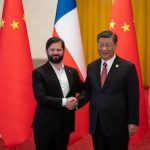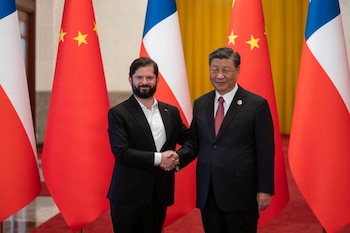


From September 9 to 14, 2024, the Minister of Defense of Chile, Maya Fernandez Allendegranddaughter of the first socialist president of Chile, Salvador Allendetraveled to the People’s Republic of China (PRC) to attend the 11th annual Xiangshan Defense Forum in Beijing. The meeting, the most significant event of the People’s Liberation Army (PLA) global defense “diplomacy” during the year, was attended by more than 500 representatives from more than 90 countries, including 30 defense ministers. During his stay there, presumably after numerous positive encounters and the generous hospitality of the PLA and a meeting with the PLA Defense Minister, Dong JunMinister Fernández publicly proclaimed her interest in reviving closer defense cooperation between Chile and the EPL. His statement, which included the intention to reactivate a previously established RPC-Chile Joint Labor Commission.
His expressed desire to revitalize the Chile-China defense relationship generated significant controversy in Chile, including criticism from the former defense minister. Jorge Burgosas well as respected Chilean strategists such as Manfred Wilhelmy. Critics expressed concern that Minister Fernández was committing to significant changes in Chilean foreign policy that could undermine the country’s relationship with important partners such as the United States, as well as opening Chile to risks of espionage through the Expansion of PLA access to Chilean military institutions and personnel. Members of the Defense Commission of the Chilean Senate asked the minister to testify before the Commission to explain the strategic logic underlying Chile’s significant change in position implied by its statement in China, and whether it represents a policy change approved by the President Boric and the Chilean Ministry of Foreign Affairs or coordinated with them.
In response to such concerns, Defense Minister Fernández emphasized that she had not signed any new commitment formal during his stay in the PRC, but had only committed to increasing the cooperation already contemplated in the PRC-Chile Defense Cooperation Agreement that the former Chilean Defense Minister Andres Allamand signed with its Chinese counterparts in June 2011. That agreement, like accession to China’s Belt and Road initiative and other ambiguous memoranda of understanding that governments in the region, illustrates how the PRC uses a web of contracts and apparently non-committal statements to involve their partners in relationships that can be exploited later when opportunities arise with more willing, or needy, governments.
To date, Chile’s defense relationship with the PRC has resembled that of other Western democratic governments that have reasonably strong institutions, and that wish to benefit from interactions with the defense establishments of a number of regimes in the sphere of interest of their country, without endangering basic relations with countries aligned with their values, which contribute significantly to institutional capacities.
Both the PRC and Chile have military attachés in their respective countries. Chile has sent officers to the People’s Liberation Army National Defense University since 1997, and the Chilean army language school hosted two People’s Liberation Army Mandarin instructors for several years starting in 2005. Chinese vessels have operated for a long time from southern Chilean ports to resupply the PRC government’s scientific facilities in Antarctica. After the signing in 2011 of a defense cooperation agreement between Chile and the People’s Republic of China, in 2013 Chile received the visit of the Lanzhou and Liuzhou frigates of the Chinese People’s Liberation Army Navy and carried out combat exercises with they. These Chinese warships, accompanied by a fuel support ship, began transiting the Strait of Magellan. In December 2018, the Chinese hospital ship “Peace Arc” visited Chile as part of a broader trip to the region.
The PLA and the Chilean military have also interacted periodically in naval exercises in the Pacific Ocean such as RIMPAC, as well as in forums such as the Western Pacific Naval Symposium. Chinese defense companies are regularly present at important Chilean military fairs such as EXPONAVAL and FIDAE.
In the space field, the Chinese government has operated an astronomical observatory on Cerro Calán, near Santiagowhile the Chinese Satellite Launching and Tracking and Control (CLTC) organization, affiliated with the People’s Liberation Army (PLA), operates two C-band radars relevant for military purposes at the facilities of the Santiago Satellite Station, in the north of the country.

The agenda of Defense Minister Fernández’s trip to the PRC, which included her arrival three days before the start of the forum so she could visit other PRC government facilities, suggests the likely initial direction of cooperation initiatives between Chile and the PRC. . Her visit to China’s National Defense University suggests a possible increase in Chilean security sector personnel attending courses there, and possibly reciprocal visits to Chilean military institutions, with the minister mentioning such cooperation at Chile’s ANEPE National Defense University. , in public comments. Similarly, his visit to China Electronics Technology Group Corporation (CETC) suggests possible Chilean purchases of electronic defense systems from the PRCwhile his visit to the Institute of Chemical Sciences of the Chinese Academy of Military Sciences of the People’s Liberation Army suggests interest in cooperation in military materials and other research. His meeting with the Director of China’s National Space Agency suggests an interest in expanding space cooperation between the PRC and Chile, possibly including satellite development and launch, data sharing, and possibly a move away from contract termination. mentioned above of CLTC to operate at the Santiago Satellite Station when its lease expires. Chile’s shipbuilding sector was also mentioned during the trip as an area of possible cooperation with the PRC.
People in Chile familiar with Fernández’s trip, consulted for this work, differed in their assessment of the intentions behind Minister Fernández’s commitments to the PRC. Some attributed them to the minister’s relative inexperience in defense matters and her efforts to strengthen her position within the Chilean left after being seen as cooperating too closely with the US. Others noted that, despite his words, to date, Chile has relied on US systems and support, and not the PRC, as the backbone of its defense modernization. However, the combination of their expressed intentions and the existing agreement suggests that some expansion of cooperation with the PRC is likely.
If Chile continues with this expansion of cooperation, will have to act cautiously to ensure that the benefits obtained offset the risks and are consistent with the values of civil and democratic control and human rights prioritized by the Boric government. These include the risks of espionage by People’s Liberation Army personnel who has access to Chilean institutions, and the reciprocal risk of influence of the People’s Republic of China on future Chilean leaders who are courted for long periods during educational visits and other destinations in China. It also includes the question of the values imparted to Chilean security personnel by PRC institutions, whose own security forces have actively repressed protesters in Hong Kong, Xinjiang and elsewhere, militarizing islands and challenging the territory of their neighbors in the seas. from Southern and Eastern China, supporting Russian aggression against Ukraine through arms sales, commodity purchases and other means, as well as China’s history of aggression against its neighbors India (2020) and Vietnam (1979). Chile must also consider the risks of increasing engagement with the PRC, just as it is embroiled in increasingly significant confrontations with Chile’s closest allies, the United States and the European Union in the South China Seaincluding the possibility of an invasion or blockade of Taiwan by the PRC.
The United States maintains a solid and lasting relationship of trust with Chile. The Boric government is likely to understand that sending a significant number of personnel to the PRC for courses and visits, granting access by PLA personnel to Chilean institutions and incorporating Chinese teams into security, space and other Chilean government architectures would complicate the US’s ability to share information and work closely with its Chilean counterparts, however much it may wish to do so.
The decisions that the democratic and principled Boric government in Chile makes in the coming months regarding its military relationship with the PRC will be important for how the country defines itself and its position vis-à-vis democratic regimes and not democratic in the increasingly dangerous world order.
*The author is a research professor at the Institute for Strategic Studies at the United States Army War College. The opinions expressed here are strictly his own.